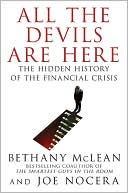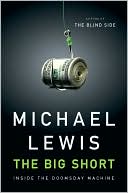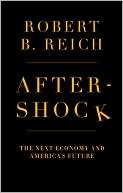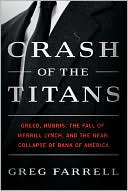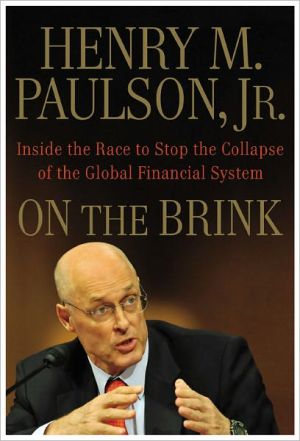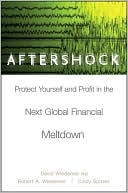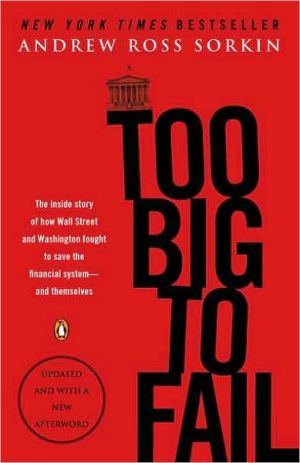Thou Shall Prosper: Ten Commandments for Making Money
A practical approach to creating wealth-based on the established principles of ancient Jewish wisdom-made accessible to people of all backgrounds The ups and downs of the economy prove Rabbi Daniel Lapin's famous principle that the more things change, the more we need to depend upon the things that never change. There's no better source for both practical and spiritual financial wisdom than the time-tested knowledge found in the ancient Jewish faith and its culture. In the Second Edition of...
Search in google:
"Life is business, and business is life. Learn one, and you will have also learned the other." In the few years since the first edition of Thou Shall Prosper was published, much has changed from both an economic and financial standpoint. But the ups and downs we've experienced have helped prove Rabbi Daniel Lapin's point that the more things change, the more we need to depend upon things that never do. There's no better source for both practical and spiritual financial wisdom than the time-tested knowledge found in the ancient Jewish faith and culture. Now, with the Second Edition of Thou Shall Prosper, Rabbi Lapin returns to provide a clear picture of how following an unwavering economic and philosophic vision of business and money—based on the established principles of Jewish tradition—can increase your potential for creating wealth. While unprecedented events have changed the world we live in, the ten fundamental "commandments" outlined throughout these pages, which relate to both business and money, are as relevant as ever. By blending contemporary business stories and his own business experiences with the wisdom of the Torah and Talmudic prescriptions, Rabbi Lapin skillfully explains the essence of each commandment—which include Believe in the Dignity and Morality of Business, Do Not Pursue Perfection, and Know Your Money—and shows you how to use them to prosper financially. Along the way, Rabbi Lapin also highlights new examples that will help you excel during difficult economic times and addresses important concepts such as "being in business for yourself"; avoiding the trappings of a "wage slave"; changing withthe times; learning to become a leader; and much more. So that you may apply each principle to your life, Rabbi Lapin suggests engaging and accessible action steps to start you immediately on the path to prosperity. With the Second Edition of Thou Shall Prosper as your guide, you'll quickly discover the powerful wealth-producing principles that lie at the root of Jewish success—and learn how to apply them to your own endeavors. No matter what your faith or background, the insights found here will put you in a better position not only to maximize your potential, but also help those around you. Publishers Weekly Combining pop psychology, snippets of Jewish lore, homespun homilies and quotations from a daunting variety of sources, Lapin offers a manual on how to make money by succeeding in business. Lapin, a super-conservative Orthodox rabbi and talk show host, insists that everyone is in business "unless you are a Supreme Court judge [sic] or a tenured university professor." (Excluding professors fits with Lapin's devaluation of them, since he believes that higher education doesn't prepare for "real life.") The material is organized into 10 chapters of advice, beginning with the notion that "business is moral, noble and worthy," and ending with the admonition not to retire. Throughout, Lapin urges behavior that will produce more business and, thus, more money. For example, he unabashedly recommends attending synagogue or church services in order to make business contacts. Similarly, he encourages giving charity to an organization that has members who "are in the best position to advance your business objectives." Lapin justifies these dubious actions by interpreting the fifth commandment ("Honor thy father and thy mother") as a mandate to form relationships for business purposes. His struggle to ground his financial advice in Jewish tradition is abandoned as he expounds an anti-environmentalist stance. He digresses still further from both Judaism and wealth-building when he gives tips for public speaking based on what his father taught him (talking without a manuscript or notes and not grasping the rostrum). Lapin's book may appeal to patient readers who share his conservative political and economic views. (Oct. 11) Copyright 2002 Cahners Business Information.
Thou Shall Prosper\ Ten Commandments for Making Money \ \ By Rabbi Daniel Lapin \ John Wiley & Sons\ ISBN: 0-471-21868-5 \ \ \ Chapter One\ The First Commandment \ Believe in the Dignity and Morality of Business\ Making money is much harder to do if, deep down, you suspect it to be a morally reprehensible activity.\ If there is one Jewish attribute more directly responsible for Jewish success in business than any other, it is this one: Jewish tradition views a person's quest for profit and wealth to be inherently moral. How could it be otherwise? As I explained in the Introduction, who I am and how I earn my living are inextricably bound together. If your chosen means of contributing to the world, and incidentally providing for your needs and desires, is immoral, then you must stop doing it because it will inevitably taint your entire existence. If your life is bifurcated into the work arena and the social arena with the two never meeting, not even in your own mind, then that is one of the first repair jobs you should undertake. Step one in the process of increasing your income is to begin wrapping yourself around these two related notions: (1) you are in business, and (2) the occupation of business is moral, noble, and worthy.\ As you will see, that view of business is not universally shared. Generally speaking, media, entertainment, and public education in the United States all subtly denigrate business. They tend tosuggest that government and nonprofit organizations do more for poor people than the private sector does and that business professionals need to be restrained from committing crimes in their single-minded pursuit of profit. It is not surprising that many other large groups in the United States have come to believe the same. This campaign has been so pervasive that everyone has inevitably been conditioned to believe it, at least to some extent. Believing that making money is a selfish activity will undermine anyone's chances of success.\ FEEL VIRTUOUS, GROW WEALTHY\ Most people understand that they enjoy greater success when they feel good about their activities. For example, in martial conflict, the defender's advantage is acknowledged by most military experts to be as much as five to one. This means that the defender's conviction of being right is enough to require a five-to-one superiority on the part of the invader in order for the attack to stand a good chance of success. That is because people tend to feel morally justified in defending their homes and families, whereas an attacker often doubts the righteousness of the cause. It follows that you would have vast additional power to inject into your enterprise if you could simply develop a deep conviction of its intrinsic morality.\ This is how people are created. For better or worse, humans are holistic. Even the human body does best when its spiritual and physical sides are synchronized. Consider the role of placebos in modern medicine. Against their rational instincts, physicians are forced to recognize that placebos have some effect. Drugs are a vital element of medicine; the patient's mind is the second vital element. Considering placebos to be effective may seem primitive. Primitive beliefs that have been categorically refuted, such as the flat earth theory, are seldom controversial. The very fact that placebos are controversial tells me that a sizable number of credible physicians are persuaded of their efficaciousness. That is what makes the issue controversial. If all doctors agreed that placebos were worthless, the debate would be over. Why would a placebo have any therapeutic impact at all? People's bodies perform better when their brains and souls are on board with the program. This is why most people choose doctors in whom they have confidence. A patient's recovery is directly linked to how much confidence that patient has in his or her medical advisers. It is almost as if your body knows what is in your mind and responds accordingly. Helping your mind to know and believe that what you do professionally is good, noble, and worthwhile in itself helps to fuel your energies and propel your efforts.\ If you feel really good about your profession, you sweep others along with you on the waves of your enthusiasm for what you do. You will become known for telling entertaining accounts of amusing incidents in your professional life. Stories about events in your business day can inspire others, and they will be moved by poignant interactions you relate. These natural and positive aspects of your public persona flow inevitably from feeling pride and passion for your work.\ You see, increasing your ability to create wealth is not just a matter of knowing a technology. It is not just a matter of knowing what kind of investments to seek or knowing how to write a resume. Having additional money in your pocket, real spendable money, is not the same as having a pen or a cigar lighter in your pocket. A substantial and meaningful increase in the amount of money you own changes you. You become a slightly different person, and people notice the change. Now if extra money makes a new person of you, it easily follows that making a new person of you is a step on the road to having more money.\ This is what it might look like expressed as a mathematical equation:\ Old you + More money = New you\ Now, subtracting "Old you" from both sides of the equation (remember that whatever you do to one side of the equal sign you must also do to the other), we have\ More money = New you - Old you\ In other words, in order to acquire more money, you need to work on far more than merely learning new skills. You have to work on changing yourself. It may not be easy, but it can certainly be done, and it works.\ As a rabbi, I have always seen the Torah as a comprehensive guide to how the world really works. For instance, I expect no conflict between Torah wisdom and chemistry, and I find none. Both, after all, are instruments that explain how the world works, each from its own perspective. Thus chemistry might remind me that just as two atoms of hydrogen combined with one atom of oxygen results in one molecule of water, so can a molecule of water be split into its constituents, hydrogen and oxygen. In other words, in the real world equations can be read both forward and backward.\ Similarly, if feeling passion and pride for my work helps me talk enthusiastically about what I do, so does talking excitedly about my work increase the passion and the pride I feel for it. This is why ancient Jewish wisdom insists that approval of our friends is an important aid to a person's business success; and likewise, people are stimulated and encouraged by their friends' approval. Even more important, this approval helps people find passion and enthusiasm in what they do.\ Conversely, if you are embarrassed about your business, you set yourself up to fail. Few sales professionals wholeheartedly and effectively promote products or services they feel to be shoddy or overpriced. Not only does your moral ambivalence inhibit all-out effort, but it also triggers a shame reflex. Instead of winning the approval of people whose opinions you value, you feel them radiating an almost palpable disapproval for your profession. You shrink into yourself and appear apologetic and embarrassed. This is hardly the posture of success. As a result, you will fail to talk about your work, thus forfeiting the everpresent advertising opportunities that present themselves in ordinary social interaction.\ Feeling virtuous about what you do is an enormous advantage and one that has been a part of Jewish tradition since time immemorial. Developing a deep conviction of the intrinsic morality and dignity of business injects vast power into any enterprise undertaken. There is a very real and practical reason that companies engage me to teach their executives and employees that the process and practice of business, although as vulnerable to misdeed as any other, is inherently dignified and moral. People who view themselves as ethical and virtuous are far less likely to step over a legal line than are people who feel that they are already deeply involved in improper conduct.\ Have you ever cheated on a diet to which you were committed? I know that I have, and I recall how much easier it was to raid the refrigerator the second time. I remembered how I had vacillated back and forth three hours earlier. "How could I ruin the good efforts of the past week?" I had asked myself. My yearnings for that chocolate cream pie were strongly countered by the realization that if I yielded to temptation, I would be turning the entire previous week of discipline into a farce. That held me off for a while, but then my stomach enzymes began howling in chorus for just a taste of that chocolate cream pie. As my fevered imagination recalled the delicious taste, I blocked out the disturbing but ever-weaker calls of my conscience, and, I am sorry to confess, I yielded. The delicious taste, I discovered, was tempered by the slightly bitter taste of failure.\ However, three hours later, when I found myself again lusting for just one more slice of the same pie, the voice of conscience was far weaker. After all, this time I would not be destroying a perfect record of disciplined restraint. I had already done that three hours earlier. What is one more little slice? Nothing really. One more little slice is never very much when you already consider yourself to have been slicing off more than you ought to have.\ The Jewish principle underpinning this observation is found in Sayings of the Fathers: "Ben Azzai said, hasten to commit good acts and flee from misdeed since every good act encourages another in its wake, while every misdeed eases the way to the next." This is one reason for the enormous emphasis that Judaism places on atonement. The origin of the word atone was when one viewed oneself as being at one with God. The annual observance of Yom Kippur, the Day of Atonement, allows Jews to reset the odometer of one's moral self-evaluation back to zero, as it were. God can once again regard us as being at one with Him. Turning over a new leaf and making a fresh start is enormously liberating. It allows one to recover one's morally driven self-restraint that might otherwise have eroded beyond the point of usefulness.\ Similarly, in business everyone encounters numerous opportunities to slice off a piece of pie that would best be left alone. Everyone finds frequent opportunities to cross the line in pursuit of just a little more. Some businessman who sees himself as already a swindling rogue just by virtue of his occupation -a greedy business professional profiting by seizing the earnings of gullible fools-should have little trouble seizing just a little more.\ No, you are not a swindling rogue. In reality, you are a noble person providing for others in a marvelous environment that benevolently rewards you for your consideration. You may find yourself smiling at these words; but once you have overcome your skepticism, you will have taken a giant step toward increasing your revenue.\ MONEY IS HOLY, AND HOLIDAYS ARE LINKED TO MONEY\ Indeed, overcoming one's skepticism about the nobility of money seems to be an intrinsic part of the original Divine plan for Jews as reflected in some of the Jewish holidays.\ One Jewish holiday in particular seems to focus on money. Almost everyone knows that Jews observe Chanukah by lighting candles on each of the eight nights of the holiday. Far less familiar are two details concerning the celebration: 1. Part of the observance is for the light from those candles to have no utilitarian purpose. For this reason, they are customarily lit in a room in which other lighting, perhaps the regular electric lighting, is blazing. This allows the candles to serve their exclusive symbolic function and perhaps stimulate a discussion among family members. Someone may well ask, "Why do we have candles lit if there is already plenty of light in the room?" Another may inquire, "Can we turn off the lights so we can see the candles better?"\ 2. There is a custom of giving children monetary gifts on Chanukah. Like other people, Jews enjoy giving gifts of various kinds on all sorts of occasions. For instance, on Purim, the feast of Esther, people give gifts of food delicacies to one another. However, Chanukah is the only holiday on which not only is it not distasteful to give a gift of money, but it is viewed quite positively, especially for children.\ These two quirks of observance are linked by their explanation. The definitive Code of Jewish Law, compiled in 1563 by Rabbi Joseph Karo of Safed in the Holy Land, emphasizes that absolutely no benefit should be obtained from using the light of the Chanukah candles. Then, conjuring up what we ought surely to condemn as an anti-Semitic stereotype, the Code declares, "And even to examine your money and to count how much money you have may not be done by the light of the Chanukah candles." What! And I suppose that on all other occasions on which Jews light celebratory candles, such as those that usher in the Sabbath each Friday night, the first thing they choose to do is count their money? Hardly. The point is that on Chanukah you are supposed to be supersensitive to your money and particularly grateful for it. This is so central a feature of the Chanukah holiday that you might have been forgiven for supposing that counting your money in front of the holiday candles would be a way of enhancing the link between Chanukah and your money. Thus the Code of Jewish Law warns that you must not count your money by the light of the candles, even though you might have imagined that especially on this holiday that is exactly what you should do. You should certainly count your money on Chanukah, just not by the light of those special candles. They have a special symbolism that is linked to the money but just a little loftier. What does light symbolize to people? Well, if you aren't sure, take a glance at your Sunday comics and see what a light bulb shown above the head of one of the characters means. It usually suggests that Dagwood has just had a bright idea. That is why folks sometimes say, "I have seen the light," when what they really mean is, "Oh yes, I understand perfectly." Or someone might ask the person to whom he is patiently explaining something, "Do you see?" In reality, Chanukah candles are intended for only one purpose, and that is to signify education and understanding. Even the name of the holiday, Chanukah, is an expansion of the Hebrew word for education. This word comprises the first four out of the five letters making up the Hebrew word Chanukah. Yes, education and money are very closely linked, but who doesn't know that? Quite a few people in the United States today, it turns out.\ \ Continues...\ \ \ \ Excerpted from Thou Shall Prosper by Rabbi Daniel Lapin Excerpted by permission.\ All rights reserved. No part of this excerpt may be reproduced or reprinted without permission in writing from the publisher.\ Excerpts are provided by Dial-A-Book Inc. solely for the personal use of visitors to this web site. \ \
Introduction1The First Commandment: Believe in the Dignity and Morality of Business17The Second Commandment: Extend the Network of Your Connectedness to Many People55The Third Commandment: Get to Know Yourself89The Fourth Commandment: Do Not Pursue Perfection127The Fifth Commandment: Lead Consistently and Constantly167The Sixth Commandment: Constantly Change the Changeable, While Steadfastly Clinging to the Unchangeable201The Seventh Commandment: Learn to Foretell the Future235The Eighth Commandment: Know Your Money265The Ninth Commandment: Act Rich: Give Away 10 Percent of Your After-Tax Income293The Tenth Commandment: Never Retire315Epilogue337Notes341Index351
\ Publishers WeeklyCombining pop psychology, snippets of Jewish lore, homespun homilies and quotations from a daunting variety of sources, Lapin offers a manual on how to make money by succeeding in business. Lapin, a super-conservative Orthodox rabbi and talk show host, insists that everyone is in business "unless you are a Supreme Court judge [sic] or a tenured university professor." (Excluding professors fits with Lapin's devaluation of them, since he believes that higher education doesn't prepare for "real life.") The material is organized into 10 chapters of advice, beginning with the notion that "business is moral, noble and worthy," and ending with the admonition not to retire. Throughout, Lapin urges behavior that will produce more business and, thus, more money. For example, he unabashedly recommends attending synagogue or church services in order to make business contacts. Similarly, he encourages giving charity to an organization that has members who "are in the best position to advance your business objectives." Lapin justifies these dubious actions by interpreting the fifth commandment ("Honor thy father and thy mother") as a mandate to form relationships for business purposes. His struggle to ground his financial advice in Jewish tradition is abandoned as he expounds an anti-environmentalist stance. He digresses still further from both Judaism and wealth-building when he gives tips for public speaking based on what his father taught him (talking without a manuscript or notes and not grasping the rostrum). Lapin's book may appeal to patient readers who share his conservative political and economic views. (Oct. 11) Copyright 2002 Cahners Business Information.\ \

